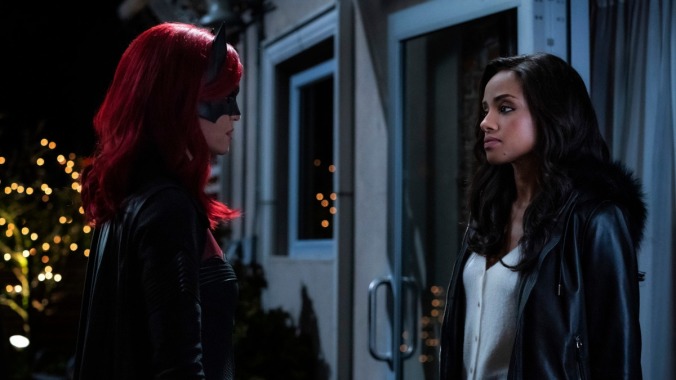Batwoman has spent a good chunk of its first season in morally murky waters. There are plenty of superhero stories that complicate the idea of what it means to be a hero when dealing with personal demons, but what’s been interesting here is the show’s handling of its villain, Alice. Batwoman has refused to tell us, one way or another, how we should feel about her. Our understanding of who she is, who she used to be, what she wants, and who’s responsible for her turn to villainy, has changed numerous times across the first season. It’s been interesting to watch, if not exactly coherent in a narrative sense.
In other words, the show has had its ups and down regarding Alice. Drawing a complicated character can lead to convoluted storytelling, and that’s happened a lot this season. The show has mostly done a good job of presenting Alice as a character that deserves both our revulsion and sympathy, but it hasn’t always managed to use those conflicted feelings to craft meaningful episodes. There’s a lot of telling rather than showing, the show relying too much on exposition and not enough on the complex character dynamics.
That’s all to say that this week’s episode feels like the payoff to all that messiness. “Off With Her Head” is a focused, character-driven hour of television that finally gives Alice the full attention she deserves. Finally, we understand Alice in a deeper way, and then the show uses that understanding to complicate our feelings about Kate. This is Batwoman not just telling you that “heroes and villains are complex people,” but instead doing the character work and making us feel it.
Where the previous flashbacks have felt clunky, the ones in “Off With Her Head,” which are a mix of hallucinations and actual narrative flashbacks, are substantial. We’re no longer in the realm of watching Beth come to the realization that she won’t be reunited with her family. We’re into the part of her life where she turns into something more evil, where she’s forced to harden in order to survive. The catalyst is the appearance of Cartwright’s truly awful mother. She lives with them for awhile, unable to take care of herself, and she’s quick to abuse Beth at every turn, pouring hot tea on her hands when she’s dissatisfied.
Or at least, Cartwright positions her as the catalyst for Beth’s change into Alice, but that’s just a ploy to shift the responsibility from himself. He brought Beth into this mess, exposed her to his mother, and as Kate points out, he’s the one that, you know, trapped her in a basement and forced her to make skin masks.
Anyways, this is all part of a twisty plot that serves to show how easily one can slip into anger and rage when confronted with traumatic events, and how difficult it can be to recover after. For Alice, she’s changed forever when she finds her mother’s head in Cartwright’s fridge, and there’s a symbolic killing by fire that signals that change. Alice is forever haunted, the hallucinatory demons she battles here just the manifestation of the ones she’s been battling since the accident.
But the trauma she experienced isn’t experienced alone. After all, she was Beth before she was Alice. She had a family, and now that family is having its own wounds exposed. Jacob and Kate press Cartwright to reveal where he’s holding Alice hostage, and Jacob heads out to save her, still hoping that he can reclaim some her humanity in the process. But while he’s out, Cartwright pokes deeper into Kate’s own wounds, revealing the story of her mother’s head in his fridge. Kate, having spent so much time preventing her father from killing Cartwright, loses it and kills him herself, strangling him to death.
None of this storytelling is particularly new. Almost every superhero story has its hero cross the line at some point in order to grapple with the ethics of this whole vigilante business, but it’s still nice to see the show handle the familiarity well. There’s something to be said for using a tested formula to deepen your character work, and that’s what “Off With Her Head” accomplishes.
Stray observations
- I’ve been down on Jacob’s character for most of the season, but his vibe in this episode is very “detective in a ‘40s noir” and I love it. I mean, when Cartwright wakes up after being knocked out, the first thing Jacob says is “rise and shine you son of a bitch.”
- “I wasted my life with a man who never loved me and who took too long to die.”
- That staple gun scene was all sorts of icky.
- Your regular Batwoman reviewer will be back next week! Thanks for reading me in the meantime.

